 Petzlover
Petzlover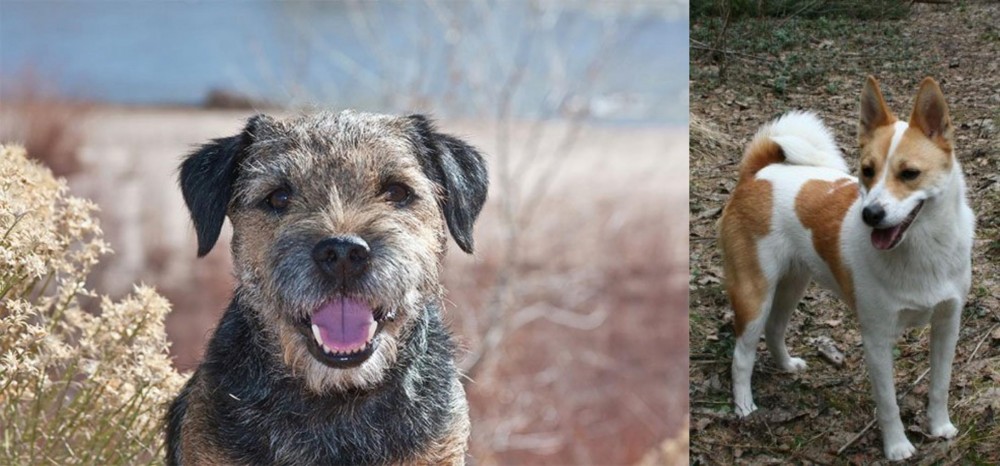 Border Terrier is originated from United Kingdom but Norrbottenspets is originated from Sweden. Border Terrier may grow 6 cm / 2 inches shorter than Norrbottenspets. Border Terrier may weigh 8 kg / 17 pounds lesser than Norrbottenspets. Both Border Terrier and Norrbottenspets has same life span. Border Terrier may have more litter size than Norrbottenspets. Border Terrier requires Moderate Maintenance. But Norrbottenspets requires Low Maintenance
Border Terrier is originated from United Kingdom but Norrbottenspets is originated from Sweden. Border Terrier may grow 6 cm / 2 inches shorter than Norrbottenspets. Border Terrier may weigh 8 kg / 17 pounds lesser than Norrbottenspets. Both Border Terrier and Norrbottenspets has same life span. Border Terrier may have more litter size than Norrbottenspets. Border Terrier requires Moderate Maintenance. But Norrbottenspets requires Low Maintenance
 As a working dog, the Border Terrier comes from the border country between England and Scotland. To be more specific, the dog originates from the rough hill country in the areas on both sides of the border between England and Scotland – an area known as 'The Border Country'. The breed was developed by the farmers, using the Terriers to help contain the fox population.
As a working dog, the Border Terrier comes from the border country between England and Scotland. To be more specific, the dog originates from the rough hill country in the areas on both sides of the border between England and Scotland – an area known as 'The Border Country'. The breed was developed by the farmers, using the Terriers to help contain the fox population.
It is believed that they are related to other kinds of terriers which also came from this region such as the Bedlington- and Dandie Dinmont Terriers. The first Border Terrier was registered in 1913 with the British Kennel Club. Later, the Border Terrier Club was also formed. A club for these dogs was also registered in the United States in 1930.
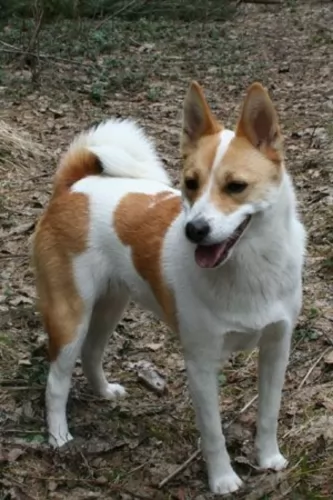 The Norrbottenspets is an ancient dog breed whose purpose has been to hunt, although these days he is a companion dog.
The Norrbottenspets is an ancient dog breed whose purpose has been to hunt, although these days he is a companion dog.
Hailing from Noorbotten, Sweden, it was after the second world war that the breed almost became extinct. This was because hunting dogs were no longer needed.
Luckily a breeding program was started, and in 1967 the Swedish Kennel Club registered the dog and a new standard was written. His friendly, amicable nature makes him a sought after companion today.
 The Border Terrier is a small to medium sized dog, weighing roughly between 5- and 7kg and standing at anything between 28 and 40cm in height. With his dark brown eyes and keen, alert expression, and with ears dropping forward, people describe the head as being like that of an otter. He is a courageous worker and a loyal companion but some people may not take kindly to him wanting to dig under-, or climb over barriers to get out to follow a scent or to go exploring.
The Border Terrier is a small to medium sized dog, weighing roughly between 5- and 7kg and standing at anything between 28 and 40cm in height. With his dark brown eyes and keen, alert expression, and with ears dropping forward, people describe the head as being like that of an otter. He is a courageous worker and a loyal companion but some people may not take kindly to him wanting to dig under-, or climb over barriers to get out to follow a scent or to go exploring.
The Border Terrier is a rough coated dogs of medium size with narrow build. The dog’s height is slightly greater than the dog’s length. The coat can be tan and black or dark grey. Sometimes the coat is described as grizzle - dark tipped hairs which give an overlay of color to the tan or red coat. You can also possibly find some white on the muzzle or chest. He has a double coat, with the outer coat being short, dense and wiry. The tail is of medium length and the ears drop forward toward their cheeks.
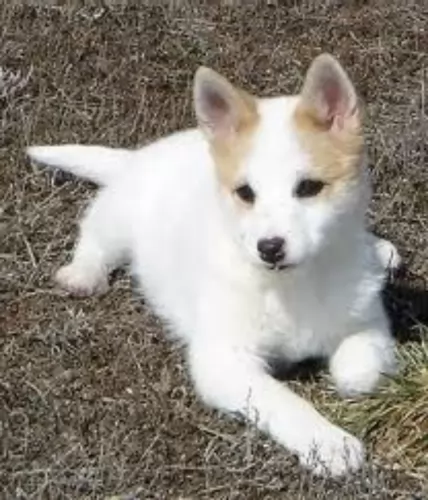 The Norrbottenspets is a small to medium sized spitz- type dog but he is muscular and compact. He stands at between 42 – 46cm in height and weighs in at between 8 and 15kg.
The Norrbottenspets is a small to medium sized spitz- type dog but he is muscular and compact. He stands at between 42 – 46cm in height and weighs in at between 8 and 15kg.
With good care he can live to be up to 15 years of age. The coat of the dog is straight and dense and you find quite a few colors such as white, yellow and reddish and sometimes there is a bit of ticking. He has a short to medium length waterproof coat which is dense.The outer coat is coarse with straight hair and the undercoat is soft and thick and the dog is a moderate shedder.
The head is wedge-shaped with erect ears, black nose and brown almond-shaped eyes. The muzzle is pointed and slim and the dog's tail is long and curls up over his back
Confident, alert and active, the Norbottenspets is an active, happy-go-lucky kind of dog, always looking for a game. It is why he gets on well with children in the home – he can sense that there is perhaps a better chance of a game with them.
He isn’t a prey-driven dog and gets on well with other pets in the home. He makes an excellent family pet and his very presence brings joy into a room as he is always cheerful.
He is stubborn and independent and will therefore require training and socialization to become obedient to your basic commands such as sit, lie-down and come.
 A Border Terrier is a dog that has to be part of the family. You can’t just stick him in your back yard as he will just pine away with unhappiness. Boredom and loneliness will cause him to bark and he has a loud bark. He’ll become destructive – characteristics that aren’t his fault because he didn’t ask to be bought and just stuck away.
A Border Terrier is a dog that has to be part of the family. You can’t just stick him in your back yard as he will just pine away with unhappiness. Boredom and loneliness will cause him to bark and he has a loud bark. He’ll become destructive – characteristics that aren’t his fault because he didn’t ask to be bought and just stuck away.
Train and socialize your Border Terrier so that he becomes the great dog he is intended to be. He gets on well will children who have been taught to be kind to animals and he will get along with other pets in the home. The Border Terrier is an affectionate, sensitive dog and once trained he is willing to obey your commands.
The Border Terrier isn’t the greatest guard dog but is best known for his loving, devoted and loyal nature. He loves his food, and if you feed him well, provide him with a warm, dry place to sleep and provide him with lots of attention and exercise, you’ll have the most devoted and loving friend for life.
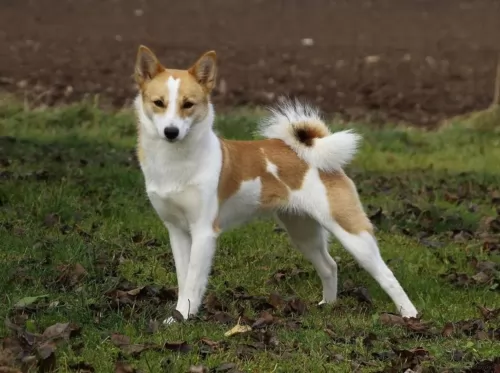 The Norrbottenspets is such an amicable, easy going pet and he is going to make you a loyal and loving canine companion. He bonds closely with his human family and will be bored and frustrated if left alone day after day in the back yard.
The Norrbottenspets is such an amicable, easy going pet and he is going to make you a loyal and loving canine companion. He bonds closely with his human family and will be bored and frustrated if left alone day after day in the back yard.
He is social and friendly and wants to be involved with the activities of his family. Feed him well, give him plenty of exercise and give him the love and care he deserves and he will make you an awesome canine companion.
 Border Terriers are a healthy breed and with good food and plenty of love and attention, they can reach 14 years of age. It is to be noted with this dog breed that he doesn’t show signs of pain or sickness easily so you want to watch him closely.
Border Terriers are a healthy breed and with good food and plenty of love and attention, they can reach 14 years of age. It is to be noted with this dog breed that he doesn’t show signs of pain or sickness easily so you want to watch him closely.
Canine Epileptoid Cramping Syndrome - This is a disease which can be evident from 7 months of age already. The disease was once known as Spike's Disease, and its an hereditary disease of Border Terrier dogs. The cause of the disease is unknown but it is similar to canine epilepsy. It is thought that a contributing factor can be gluten, so a gluten-free diet will be recommended.
Heart defects can also affect Border Terriers, one of which is pulmonic stenosis. This is a narrowing of the valve which separates the right chamber of the heart from the lungs. It can ultimately lead to arrhythmia to congestive heart failure. He’ll have difficulty with breathing, suffer from abdominal distension and won’t be able to exercise properly.
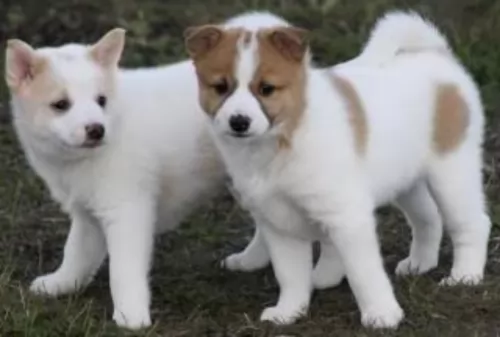 The Norrbottenspets life expectancy is between 12 and 15 years. These dogs are fairly healthy but there are always health concerns with any dog breed.
The Norrbottenspets life expectancy is between 12 and 15 years. These dogs are fairly healthy but there are always health concerns with any dog breed.
There are small numbers of the breed which are prone to a genetic condition affecting the brain and the result is poor coordination. It is sad to see because there is no known treatment and some dogs reach the stage where they can’t eat and they can’t control their toilet habits.
Dogs with hip dysplasia have an abnormal formation of the hip socket which can lead to arthritis, pain and the inability to get around. It is a genetic trait and you will need to get your pet to the vet for treatment and pain management.
 Because the topcoat of the Border Terrier is dense and harsh with a thick undercoat, he will require moderate grooming. He doesn’t shed too much. Brush your Border Terrier twice a week to remove dead hair and keep your dog’s coat healthy. As part of his grooming, keep his nails clipped as well as his teeth checked and brushed at least twice a week. Make use of specialized dog toothpaste and brush.
Because the topcoat of the Border Terrier is dense and harsh with a thick undercoat, he will require moderate grooming. He doesn’t shed too much. Brush your Border Terrier twice a week to remove dead hair and keep your dog’s coat healthy. As part of his grooming, keep his nails clipped as well as his teeth checked and brushed at least twice a week. Make use of specialized dog toothpaste and brush.
The Border Terrier can quickly put on weight so it is important to feed him according to the instructions on the packaging if you’re going to be feeding him with commercially manufactured dog food. Make sure its a quality brand and one which caters for his energy requirements.Dogs are individuals, and they don’t all eat the same amount. As a responsible dog owner, it is up to you to monitor your pet and understand his unique requirements.
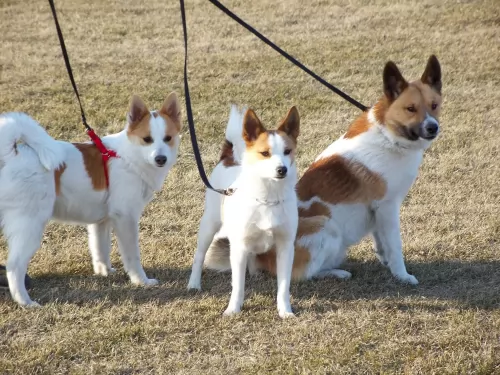 Your Norrbottenspet will be requiring a high-quality dog food if you want him to stand the best chances of being healthy. Home made food is always a good choice, but there are also some good commercially manufactured dog foods which are convenient.
Your Norrbottenspet will be requiring a high-quality dog food if you want him to stand the best chances of being healthy. Home made food is always a good choice, but there are also some good commercially manufactured dog foods which are convenient.
You want the food to have the necessary vitamins and minerals to ensure good health. Every dog will love a little bit of raw meat added to his kibble from time to time. Dogs love their meals to be consistent – no exotic, spiced foods to upset the stomach.
Boiled chicken, brown rice or pasta and cooked vegetables such as sweet potatoes, carrots and spinach can be chopped up and added to his kibble occasionally and this makes a splendid tasty treat for your pet.
You want to avoid your dog becoming overweight as this brings on a host of problems. Make sure he always has access to cool, fresh water.
The Norrbottenspets short to medium length coat will need brushing twice a week. They are clean looking dogs and you’ll find that they don’t have an unpleasant dog-smell around them.
Always check his eyes and ears for infections. Also check his teeth. A bad tooth may not be evident but it can negatively impact the immune system and cause illness with your dog.
The nails should also be cut to avoid them hooking on things.